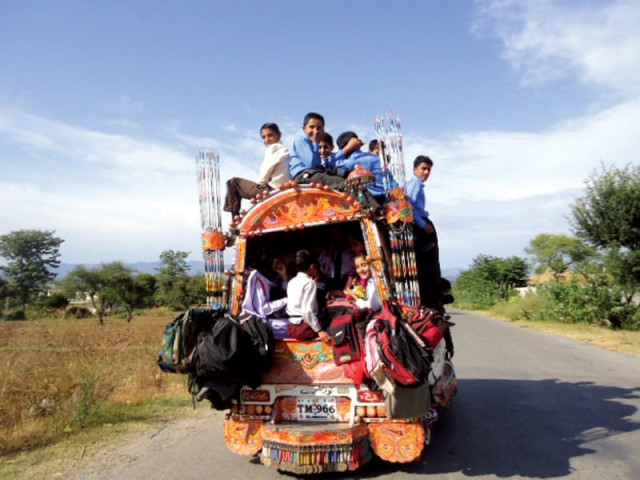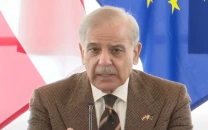If vans were turkeys, children would be the stuffing
Parents complain of overloading; van drivers say they can’t work on lower margins that come with proper seating.

At the end of the day, for van drivers ferrying schoolchildren, maximizing profits is the order of the day. It’s a competition in how best to optimise the limited space, to fit that one extra child for that extra fifteen hundred rupees.
Parents, too, are quick to complain about the heavily loaded vans but unwilling to shell out extra dough. They want their children to go schools properly seated, so long as they do not have to pay the extra Rs1,500 that come with the comfort and safety of their child.
Huma Mustafa, a resident of Afshan Colony, said she cannot afford to pay more than Rs1,500 that she is paying to the van driver that picks her child up. “If I ask him to reduce the number of children, he demands more money which I can’t afford.”
The van driver, she added, says he would not be able to bear the cost if he were to accommodate children according to the van’s seating capacity.
Tehmas Khan, a sixth grader, said, “Nearly every day we have to fight to get proper seats in the van as two students have to share a single seat. It is difficult to even breathe in the van.”
Maryam, a university student, said, “My school van’s owner had three vans when he started this business some years ago, and now he owns more than 30 vans and minibuses.”
She added that the days CNG supply is suspended, the van driver charges extra money. If someone refuses to pay “they don’t pick them up.”
The operators have their own inflation-riddled story to tell. Muhammad Rizwan, a van driver, said, “I know the seating capacity of my van is only 10, but it is impossible for me to survive [if I do not seat more children], given the fuel prices.”
Another van driver, Naveed, said normally people think that pick and drop is a very profitable business but it is not, due to high fuel prices as well as the vehicle’s maintenance.
An average van driver charges Rs1,500 per month for a distance of around 10 kilometres. Add about half a kilometre to pick and drop each child. This comes out to 28 kilometres per day or 700 per month (based on a 25-day month). The average van in Rawalpindi sits around 16 children, which comes out to Rs24,000 per month.
If a van gives the driver 8 kilometres to a litre, the monthly fuel cost on petrol at current rates comes out to slightly over Rs9,000 per month. Add wear and tear and salaries and the margins are not unreasonable if the driver optimises his route.
But by the same math, reducing the number of children the driver seats in a car by half will greatly diminish the margins, even if he relies solely on CNG, which is seldom available nowadays given the three-day weekly closure and ongoing strikes.
Traffic violations
Then there’s the issue of law. Every van carrying school children in Rawalpindi is violating traffic rules by seating double the capacity.
Rawalpindi chief traffic officer said overloading in vehicles is a criminal offence, which traffic wardens tried to curb. “Violators are fined Rs500 to Rs1,000, cases are registered against them and their vehicles are impounded.”
Muhammad Naveed, a traffic warden deputed on Peshawar Road, said about 10 to 12 vehicles are fined daily at the signal, out of which four to five ferry schoolchildren.
Another traffic warden said they let the drivers go after fining them, because “otherwise it would make children and their parents suffer and because this is the drivers’ bread and butter”.
The solution to this conundrum is not simple. While Aneela Hadayat, an LLB student, strongly believes that violators must be punished for overloading in their buses and vans, she will be one of the first ones to suffer given increased fares and low supply versus demand.
Hadayat feels the government has a role to play, and she is not wrong. But with the Capital Development Authority’s promised Rapid Bus Service still far from reality, and the existing bus services in Rawalpindi such as Varan now closed, it seems children, whose parents aren’t privileged enough to pay more or take them to school themselves, will have to be stuffed like chickens for the time being.
Published in The Express Tribune, December 10th, 2012.


















COMMENTS
Comments are moderated and generally will be posted if they are on-topic and not abusive.
For more information, please see our Comments FAQ